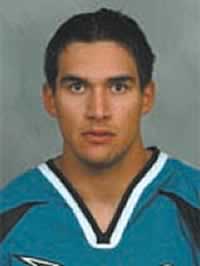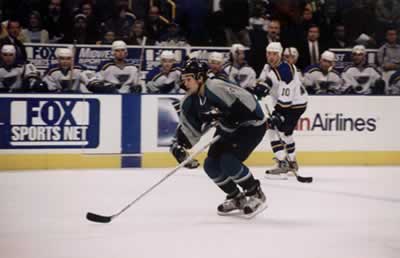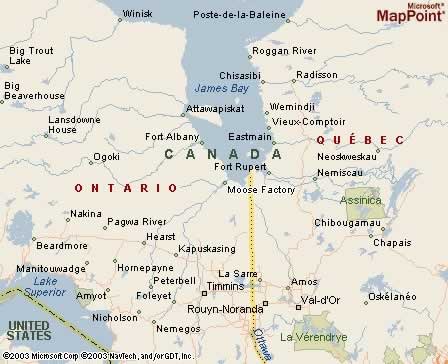|
|
Canku Ota |
|
|
(Many Paths) |
||
|
An Online Newsletter Celebrating Native America |
||
|
December 13, 2003 - Issue 102 |
||
|
|
||
|
Native Role Model |
||
|
by Ross McKeon, San Francisco
Chronicle Staff Writer
|
||
|
Cheechoo will play host to 14 high school students from Pierceland, Saskatchewan, the neighboring Canadian province to Alberta. Twelfth-graders attending the school that boasts a strong First Cree Nation's heritage have been assigned to write a biography on Cheechoo. "They're doing a report on native people so it's an honor that they chose me,'' Cheechoo said. "I'm looking forward to talking to them and giving them insights to what it's like being a hockey player.'' It's not long ago the 23-year-old right wing was in their shoes. The only difference was Cheechoo didn't have any First Cree NHLers to inspire him. There weren't any. A native of tiny Moose Factory, Ontario -- a 5-square-mile island reservation some 500 miles north of Toronto -- Cheechoo is the only member of the Moose Cree First Nation (formerly known as Moose Factory Band of Indians) to sign and play in the NHL. Even before his rookie season last year, Cheechoo's minor-league jersey was presented to the Hockey Hall of Fame in recognition of where he came from. No wonder he's playing role model after today's morning skate. "A lot of the kids up there, they're good kids,'' Cheechoo said. "We just need to get them on the right track, give them a little information here and there. If they pick some things up and learn from it, that will help them down the line.'' While growing up far, far from any NHL rinks, Cheechoo did have one source of inspiration, former Buffalo Sabres coach Ted Nolan. Nolan is an Ojibway Indian who was born and raised on the Garden River Reserve, located near Sault Ste. Marie, Ontario. He won the 1997 Jack Adams Award as NHL Coach of the Year. Previously, he had served as assistant coach with the Hartford Whalers, and led the Soo Greyhounds of the Ontario Hockey League to two league championships and the Memorial Cup, the national title, in 1993. Nolan, 45, took up coaching after injuries ended his brief pro career as a player in 1986. "I remember it was Grade 7, I got the chicken pox, missed school and I got to see him instead,'' Cheechoo said. "It was pretty neat to hear him speak about some of the things he's done and how he accomplished them. I think that was an inspiration." As it turns out, Cheechoo was an inspiration for Nolan as well. At a time when he turned the frustration of not getting another NHL head- coaching offer into starting a development program for indigenous hockey players across Canada, Nolan got a boost from Cheechoo's gracious participation.
"Jonathan was a second-round pick of the Sharks,'' Nolan said. "He didn't have to help with that team. Two weeks before what was basically his first pro camp he came to Finland.'' That was in the summer of 2000. Cheechoo had traveled a long and hard road not only to reach the precipice of his NHL dream, but to overcome a number of obstacles along the way. "There are a lot of problems in the native community with a high unemployment rate, lower self-esteem, obvious drug and alcohol problems,'' Nolan said. "I bet 98 percent of the (NHL) players never had the hurdles Jonathan's had to overcome.'' Moose Factory is only accessible by train and then either a plane, helicopter or boat. During freeze-up and ice-breakup periods, the only means of transportation between the island and mainland is by helicopter. When Cheechoo showed promise in the sport by his early teens, he moved far from home so he could continue to develop his game. "You miss your family. There are a lot of nights you go to bed crying,'' Nolan said. "It's too much for some kids and they don't stick with it. Jonathan didn't do that. It just shows what kind of character he has. "I think Jonathan might lead the next wave of players from the native communities,'' he added. "Our kids are tough because of the environment they come from. He can be a trailblazer for the next wave that's coming.'' |
|
|
www.expedia.com |
|
|
||
|
|
||
| Canku Ota is a free Newsletter celebrating Native America, its traditions and accomplishments . We do not provide subscriber or visitor names to anyone. Some articles presented in Canku Ota may contain copyright material. We have received appropriate permissions for republishing any articles. Material appearing here is distributed without profit or monetary gain to those who have expressed an interest. This is in accordance with Title 17 U.S.C. Section 107. | ||
|
Canku Ota is a copyright © 2000, 2001, 2002, 2003 of Vicki Lockard and Paul Barry. |
||
 |
 |
|
|
The "Canku Ota - A Newsletter Celebrating Native America" web site and its design is the |
||
|
Copyright © 1999, 2000, 2001, 2002, 2003 of Paul C. Barry. |
||
|
All Rights Reserved. |
||
 Edmonton
-- The spotlight will be on Jonathan Cheechoo long before the Sharks'
forward hits the ice today against the Oilers.
Edmonton
-- The spotlight will be on Jonathan Cheechoo long before the Sharks'
forward hits the ice today against the Oilers.  Nolan
assembled rosters for traveling teams from a pool of players with
far less talent than Cheechoo. But because of the respect he had
for Nolan and the pride he had for his people, Cheechoo insisted
he be part of the project.
Nolan
assembled rosters for traveling teams from a pool of players with
far less talent than Cheechoo. But because of the respect he had
for Nolan and the pride he had for his people, Cheechoo insisted
he be part of the project. 